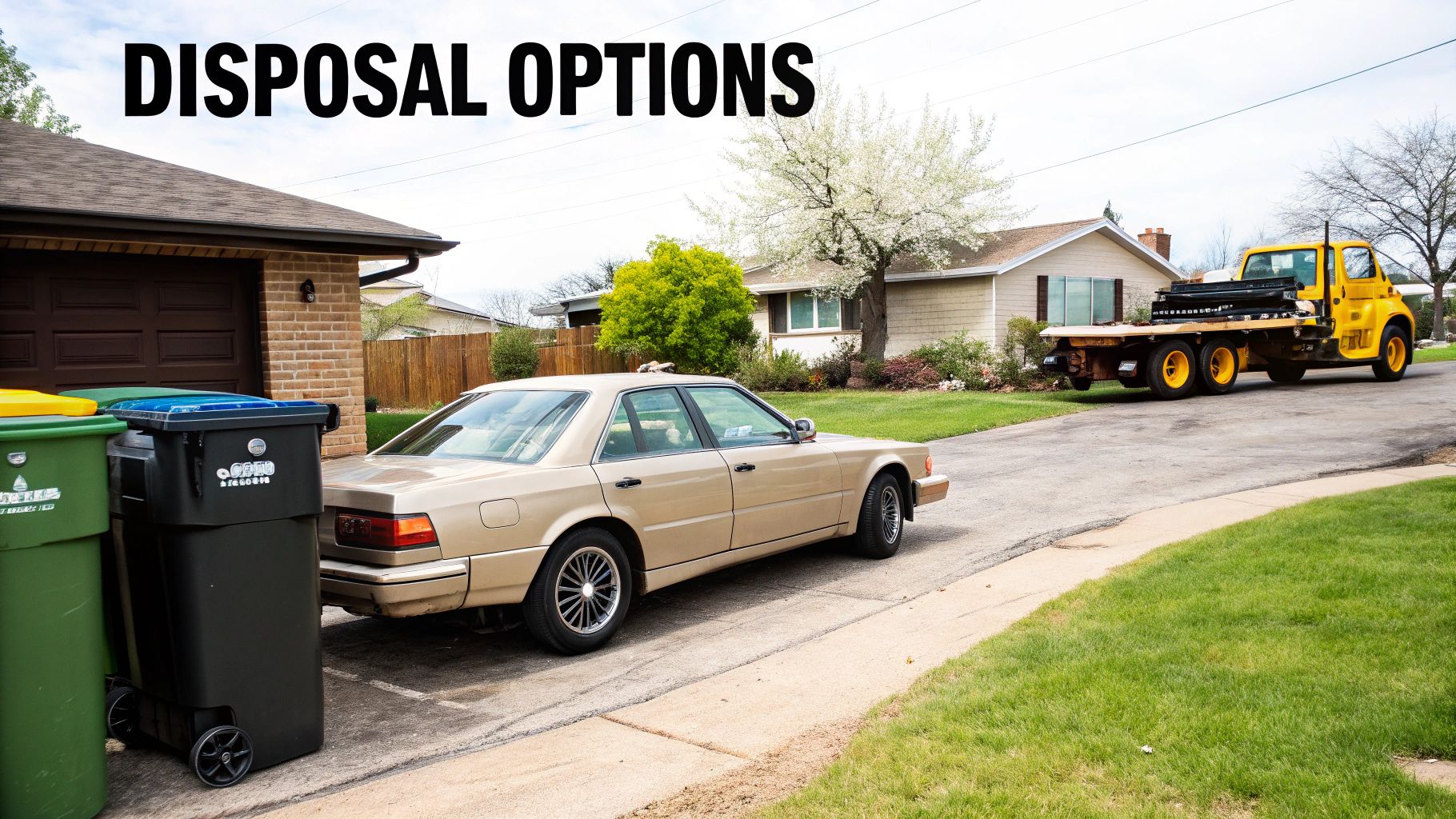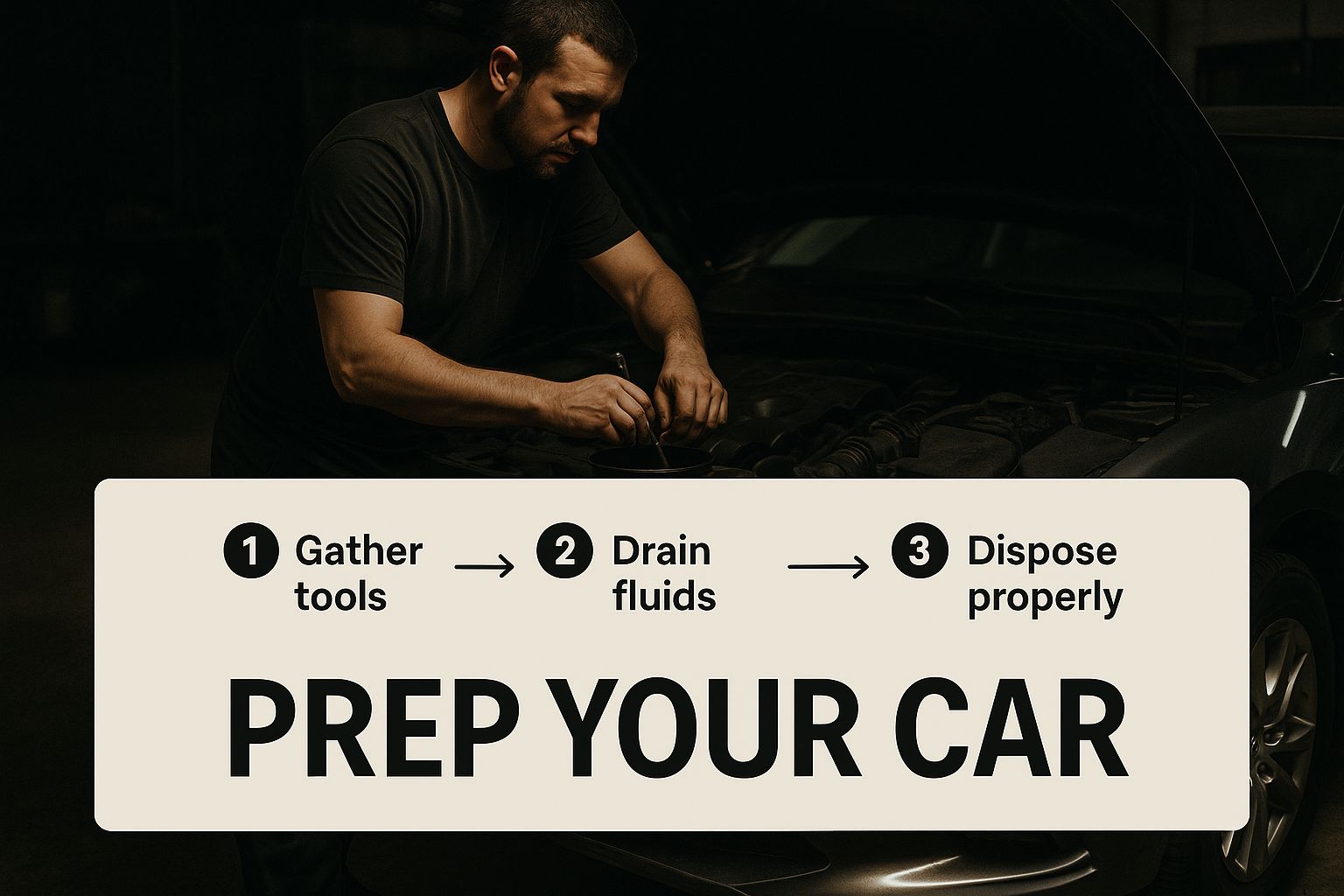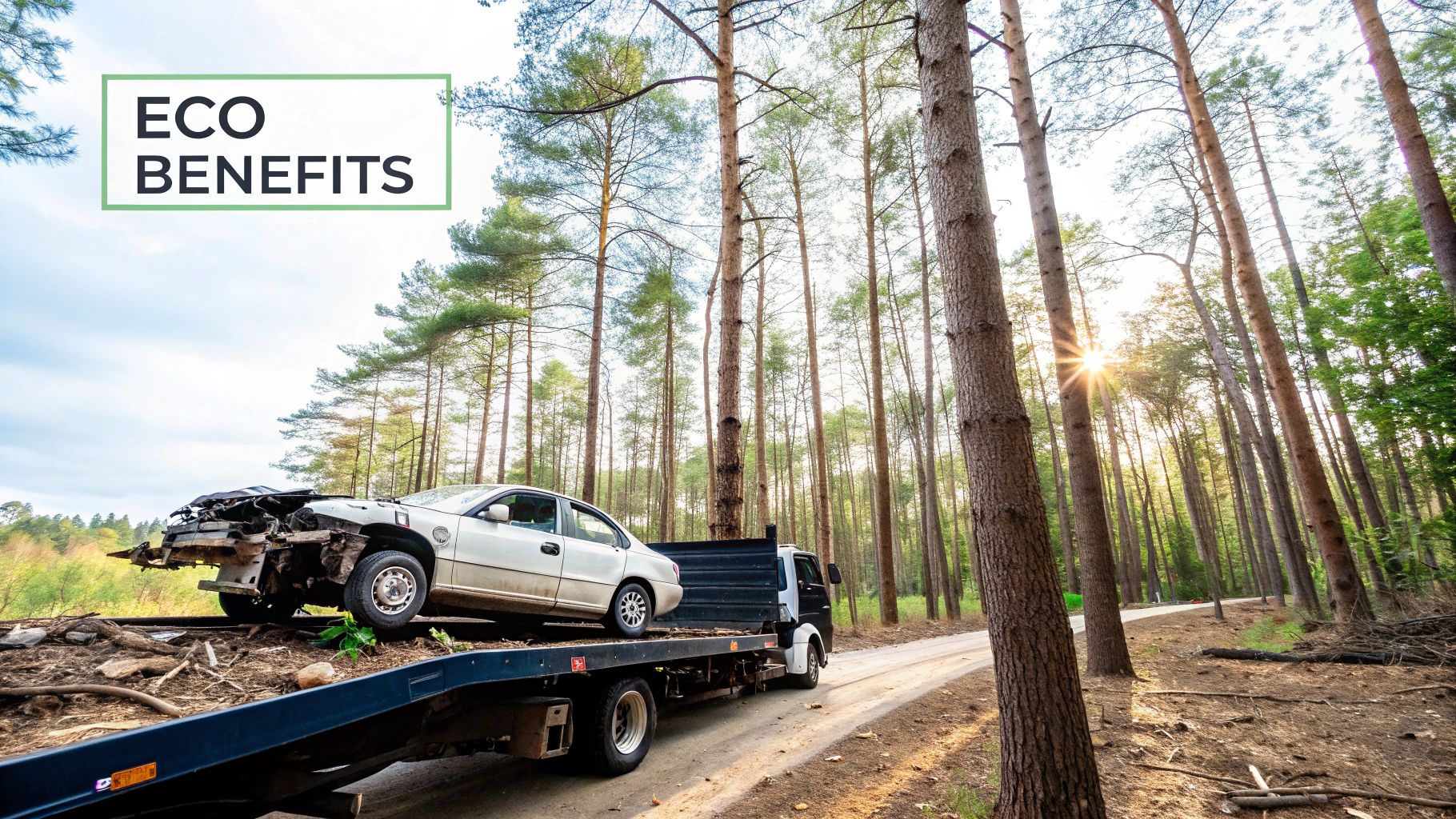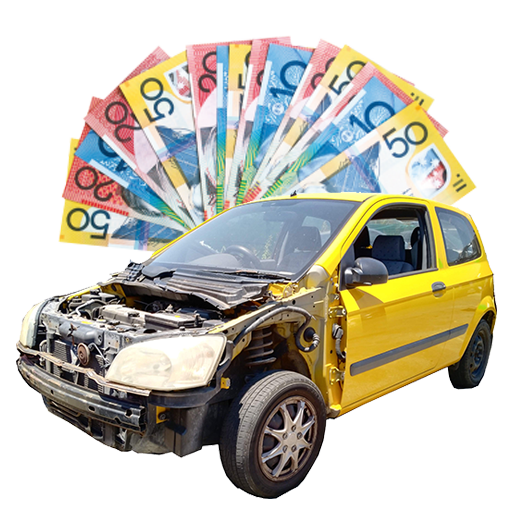So, you've got an old car taking up valuable space and you're ready to see it gone. Getting rid of it in Australia is usually a pretty painless process, and you can often walk away with a bit of cash. The best path for you really boils down to your car's condition and how much time you're willing to spend.
Your main choices are selling it to a car wrecker for quick cash, trading it in at a dealership, selling it privately if you're chasing top dollar, or even donating it to a charity.
Deciding the Best Way to Dispose of Your Car
When that old vehicle has overstayed its welcome, figuring out the right way to offload it is your first real hurdle. This isn't just about freeing up your driveway; it's a decision that affects your bank account, your schedule, and even the environment.
Is it a total non-runner that's seen better days, or is it a perfectly fine car you just don't need anymore? The answer will point you in the right direction.
It's a common situation. In Australia, around 850,000 vehicles hit the end of the road each year, creating a huge flow of metal and parts that can be recycled. Knowing your options makes sure the process is smooth and you get the best possible outcome.
Your Top Car Disposal Options
Let's break down the most common routes people take:
- Selling to a Wrecker: This is hands-down the fastest way to get cash, especially for scrap, damaged, or non-running cars. Most reputable wreckers offer free towing and take care of the paperwork for you. It's a no-fuss solution.
- Private Sale: If your car is still in good nick, selling it privately will almost always get you the most money. The trade-off? It takes more work. You'll need to handle advertising, field calls from potential buyers, and arrange viewings.
- Dealership Trade-In: This is super convenient if you're already buying a new car from a dealership. You just hand over the keys. Be aware, though, the trade-in value you're offered will likely be less than what you could get from a private sale.
- Donation: Feel like doing some good? Donating your car to a registered charity is a fantastic option. While you won't get cash in hand, you get the satisfaction of supporting a cause you believe in.
Making a smart choice from the get-go will save you a world of hassle. If you're still weighing things up, our guide on where to sell your vehicle offers a deeper dive into each avenue.
Car Disposal Options at a Glance
Sometimes, seeing it all laid out makes the decision easier. This table gives you a quick snapshot of what to expect from each method.
| Disposal Method | Potential Cash Return | Effort Level | Typical Speed |
|---|---|---|---|
| Sell to a Wrecker | Low to Moderate | Low | Very Fast (1-2 days) |
| Private Sale | High | High | Slow (Weeks to Months) |
| Dealership Trade-In | Low to Moderate | Low | Fast (Same day) |
| Charity Donation | None (Tax receipt) | Low | Moderate (Varies) |
Ultimately, whether you're after maximum cash, maximum convenience, or a bit of both, there's a disposal method that fits your needs.
A Quick Checklist Before Your Car Gets Towed Away
Before you watch that old car get hauled away for the last time, there are a couple of crucial things you need to do. Taking a few minutes for some prep work can save you a lot of headaches down the track and makes sure the whole process is clean and final.

First up, give it a thorough clean-out. We're not talking about a detail, just getting all your personal stuff out. Check the glove box, under the seats, in the boot, and all those little side pockets. It’s amazing what people forget – I’ve heard stories of everything from lost jewellery to important paperwork being found later on.
Once your bits and pieces are out, it's time to deal with the paperwork. You'll need to cancel your registration and let your insurance company know the car is no longer yours. This is a big one. It officially severs your ties to the vehicle, so you're not on the hook for anything that happens after it leaves your hands.
Should You Bother Cleaning It?
This is a question we get all the time. Is it worth putting in the elbow grease to clean it or fix a small ding? Honestly, it all comes down to how you're getting rid of it.
-
Selling to a wrecker? Don't waste your time. When you use a service like ours, we're looking at the value of the scrap metal and any usable parts. A shiny exterior or vacuumed floor won't change the cash offer you receive.
-
Selling it privately? Absolutely. A clean, well-presented car can make a huge difference to a private buyer. It suggests the car has been well looked after and can definitely help you get a better price.
When you're using a cash for cars service, focus your energy on clearing out your personal items and getting the ownership documents in order. The real value is in the car's weight and components, not how clean it is.
Choosing Your Best Disposal Option
Alright, your car is cleaned out and you're ready to make a move. Now comes the big decision: how do you actually get rid of it? There are a few different ways to go, and each one offers a unique mix of speed, convenience, and cash in your pocket. Let's break them down so you can figure out what makes the most sense for you.
For a lot of people, especially if the car is a non-runner or has seen better days, the "cash for cars" route is the most direct path. Services like ours specialise in buying cars for their scrap metal and usable parts. The beauty of this process is its speed—we can often have the car gone and cash in your hand within 24 hours.
Cash For Cars Services
When you go with a car removal service, the offer you get is mostly tied to the car's weight and the current market price for scrap metal. It's a pretty straightforward system that doesn't really care about a few dings or a faded paint job. Because of this, it's always a good idea to get a few different quotes to make sure you're getting a fair price for that day's market. If you're curious about how that works, you can get a better idea by checking out our guide to scrap metal car prices.
The biggest perk here is pure convenience. Any good company will handle all the logistics, and that absolutely must include free towing. If anyone tries to charge you for collection, that's a massive red flag. Thank them for their time and find someone else.

Once a car is collected, licensed professionals take over. They handle crucial environmental steps, like draining all the fluids, before the recycling process really begins.
Selling Privately for a Higher Return
If your car still runs well and is in reasonable nick, you'll almost always get the most money by selling it privately. Be warned, though: this route demands the most work. You're in charge of everything from taking good photos and writing compelling ads to fielding calls and arranging test drives.
Safety is a huge deal here. Always meet potential buyers in a busy, public place during the day. And a golden rule I always tell people: never, ever hand over the keys until you can see the cleared funds sitting in your bank account.
A private sale will maximise your profit, but it also maximises your time investment and personal risk. You have to be ready for the negotiations, the tyre-kickers, and all the paperwork involved in transferring ownership.
Dealership Trade-Ins and Donations
Trading in your old car when you buy a new one from a dealership is convenience at its peak. You just drive the old one in and leave with the new one. The catch? The trade-in value you'll be offered will almost certainly be less than what you could get selling it yourself. You're paying for the simplicity.
Lastly, there's always the option to donate your car. It’s a great, selfless act that supports a cause you believe in. You won't get any cash, but you will get a good feeling. Just be sure to do your homework and confirm the organisation is a legitimate, registered charity so your generous gift makes a real difference.
So, what actually happens after the tow truck disappears down the road with your old car? It's not just left to rust in a forgotten corner of a yard. Instead, it kicks off a surprisingly sophisticated process to give its materials a new lease on life. Knowing what's involved can be reassuring, as you see just how environmentally sound your decision really is.
The very first stop is the depollution bay. Here, a trained team methodically drains every last drop of hazardous fluid. We're talking engine oil, coolant, brake fluid, and any leftover petrol. These aren't just dumped; they're collected carefully to be recycled or disposed of according to strict safety standards, keeping them out of our soil and waterways.
Stripping Down for Parts
With the car now free of liquids, the next stage is to salvage any parts that are still in good nick. Mechanics comb over the vehicle, unbolting and removing components that can be used again.
- Mechanical Bits: The big-ticket items like engines, transmissions, alternators, and starter motors are often pulled out, tested, and sold as affordable second-hand parts.
- Body Panels: Doors, bonnets, and guards that haven't been smashed up are also rescued.
- Interior Components: It's not just the oily bits. Things like seats, dashboards, and even stereo systems can find their way into another car.
This dismantling phase is a critical part of the process. It's the ultimate form of reuse, keeping functional parts in circulation and ensuring as little as possible goes to waste.
The whole modern car recycling system is a masterclass in efficiency. A good operator will make sure nearly every single piece of your car is either reused or repurposed, which seriously slashes its environmental impact and helps build a circular economy.
Shredding and Sorting Materials
After all the usable parts have been stripped away, you're left with a bare metal shell. This is where the heavy machinery rolls in. The shell is loaded into an enormous shredder that rips it into fist-sized chunks of metal in just a few seconds.
From there, these metal fragments tumble onto a conveyor belt. Powerful magnets pass over the belt, plucking out the ferrous metals like steel and iron. Australian car recyclers are also using more advanced tech to sort through the remaining material, improving how they recover plastics, glass, and other bits and pieces from end-of-life vehicles. You can see some of these innovations in vehicle recycling on YouTube to get a better idea.
Finally, the sorted metals are cleaned, melted down in a furnace, and recycled into new steel products, ready to start a new life. This saves an incredible amount of energy and raw materials compared to making steel from scratch.
Don't Skip The Paperwork – Your Key to Avoiding Future Fines
The tow truck is gone and you've got cash in your hand. It’s tempting to call it a day, but there’s one last job that’s absolutely critical. Sorting out the final paperwork is the only thing that legally protects you from any future fines, tolls, or headaches linked to your old car. Don’t think of it as just red tape; it's your official exit pass from ownership.

Every state and territory in Australia has its own process, but it usually involves a "Notice of Disposal" or a similar vehicle transfer form. You need to fill this out and lodge it with your local transport authority—whether that's Transport for NSW, VicRoads, or your local equivalent—right after the sale. This is what officially takes your name off the car's registration.
Get Your Own Proof of Sale
On top of the official government forms, I always tell people to create their own simple proof of sale or receipt. This little piece of paper can be a lifesaver if any questions pop up down the track.
Make sure your receipt includes these details:
- Who's Who: The full names and addresses of both you and the buyer.
- The Car's Identity: The VIN, registration number, make, and model.
- The Deal: The exact date, time, and the price you agreed on.
- Signatures: Get both you and the buyer to sign it to make it official.
Consider this paperwork your legal shield. With around 850,000 vehicles being retired each year, you can imagine the sheer volume of transfers the authorities handle. Getting your documents right ensures your sale is recorded properly, protecting you from any loose ends.
This step is more important than ever, given the trends in vehicle registrations tracked by BITRE. You can dive into the latest vehicle statistics from the Australian government if you're curious.
Wrestling with state-specific forms can feel a bit much, especially if you're missing certain certificates. If that’s your situation, you can get the full rundown in our guide on selling a car without a roadworthy. Ticking these final boxes means you can walk away with complete peace of mind.
Answering Your Car Disposal Questions
When you're looking to get rid of an old car, a few common questions always seem to come up. Sorting through the answers can make the whole thing feel a lot less intimidating. Let's clear up some of the most frequent queries so you can move forward with confidence.
Can I Get Rid of a Car Without the Rego Papers?
In most cases, yes, you absolutely can. If you’re the legal owner, a good ‘cash for cars’ service or auto wrecker will usually take the vehicle without the official registration papers.
You will, however, need to prove you own it. This means showing a valid photo ID, like your driver's licence. They'll also likely ask you to sign a declaration form stating you are the legal owner. My best advice? Give them a quick call beforehand just to double-check exactly what they need from you.
How Much Is My Scrap Car Actually Worth?
This is the big one, and the answer really depends. The amount of cash you'll get for a scrap car swings based on its make, model, weight, and—most importantly—the current market price for scrap metal, which changes all the time.
As a general rule of thumb, a standard passenger car will probably fetch you somewhere between $150 and $500. Heavier vehicles, like a 4WD or a van, have more metal and will naturally bring in a better price. To make sure you're not getting short-changed, always make a point of getting at least three different quotes from local operators.
If your car isn't running, the most environmentally sound choice is a licensed auto recycler. They are equipped to properly drain all the hazardous fluids and can recover and reuse over 90% of a car's materials, keeping a massive amount of waste out of landfill.
Do I Have to Pay to Get My Old Car Towed?
No, you should never have to open your wallet for towing. Any reputable car removal service in Australia will include free towing as a standard part of their deal. It’s built into their business model; they make their money from recycling the metal and selling off any usable parts.
If a company ever tries to slap on a towing fee or tells you they'll deduct it from your payout, treat it as a massive red flag. That’s a clear sign you should hang up and find someone else to deal with.
Ready to turn that unwanted car into instant cash without any hassle? The team at Auto Removal Adelaide offers top-dollar quotes and free, same-day towing across the region. Find out how much your car is worth today by visiting the Auto Removal Adelaide website.


